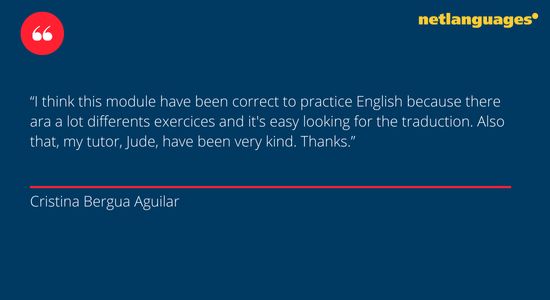- Voxy on LinkedIn
- Get in Touch

- Student area


English for Tourism & Hospitality
For tourism and hospitality professionals who interact with people from all around the world, being able to communicate in English is essential.
Course Overview

English for Tourism and Hospitality is designed to provide learners with the skills and vocabulary for careers in hotel management and tourism.
Featuring content from

Learn how to greet and receive guests at a hotel.
Learn how to handle reservation inquiries and issues at a hotel.
Learn how to respond to specific guest requests.
Learn how to talk about various hotel amenities.
Learn how to communicate with the housekeeping team.
Learn about the roles and responsibilities associated with managing a hotel.
Learn how to give suggestions and directions to guests.
Learn how to check out guests at a hotel.
Learn about serving guests at a hotel restaurant.
Learn about serving guests at a hotel bar.
Learn how to talk about tour packages and different parts of a daily itinerary.
Learn about managing attractions such as zoos and theme parks, how to discuss the responsibilities associated with attraction management and how to talk about different types of attractions.
Learn about managing large and small events, including the steps in event planning and how to deal with clients.
Review resources related to hotels from the course.
Courses on any subject are available
We are constantly adding new courses to help learners with their career-specific English skills, and can easily include new ones to meet the particular needs of your learners.
- Personalized Units
- Authentic Content
- Career-Aligned Courses
- Curriculum-Aligned Courses
- Content Integration
- Customer Success
- Learner Engagement
- Voxy Proficiency Assessment®
Live instruction
- Private Classes
- Group Classes
- Teacher Platform
- News & Press
- Teach with us
- Corporations
- Channel Partners
- Privacy Policy
- Terms & Conditions
Learner Support
- Learner Help Center
- Contact Support
Partner Support
- Partner Help Center
Copyright © 2024 Voxy. All rights reserved
Developed by

- Student login
- Programs for Companies
- Learning Experience Platform (LXP)
- Mobile app (Android & iOS)
- Reporting (Command Center)
- Voxy Proficiency Assessment (VPA®)
- English Courses
- Financial Sector
- Diversity, Inclusion and Social Justice Course
- All Courses
Privacy Overview
CISE | Cambridge International School of English
English for tourism and hospitality.
English for Tourism and Hospitality is aimed at managers who work in the tourism and hospitality industry and need to use clear, accurate English in everyday work-related situations. The course can be taken alongside a degree or professional qualification studies elsewhere or as part of an informal career development programme. It will be of particular value to prospective students applying to study at a university abroad or to undergraduate, postgraduate or professional students of tourism and hospitality marketing, event management and business administration. Likewise, the course is suitable for those who run their small tourism businesses or work in travel agencies, hotels or events management firms.
Course duration: 4 months
CEFR levels: B2-C1 (Upper-Intermediate/Advanced)
What do English language CEFR levels mean?
Age groups: young people (16-18) and adults (19+)
Study method: online learning with tutor’s guidance and support
Course fees for the 2024/2025 academic year: £880
Next course start date: 1 October 2024
Register by: 20 September 2024
By the end of the course, learners will:
- develop English language skills: grammar, reading, listening and writing
- expand specialist vocabulary: types of tourism, careers in tourism and hospitality, hospitality research, types of events, theme parks, impact of tourism, sustainable tourism
- practise specialist vocabulary related to business administration in the tourism and hospitality sector: operations, finance, IT, law, human resources, marketing, sales, distribution, project management, workplace communication, external influences, strategic planning
- improve personal skills: leadership and management, time management, stress management, education and training, interpersonal communication skills, cross-cultural communication skills, professional ethics
- develop business skills: applying for a job, interviewing, telephoning, business correspondence writing, presentations, negotiations
Key features of the course
- Flexibility to suit your needs – allowing you to study anytime, anywhere
- An emphasis on personal and professional development through independent learning
- Relevance of topics, terminology and language skills to the context of communications in tourism and hospitality business
- Certificate of completion from Cambridge International School of English
Teaching and assessment
A tutor will guide you throughout the study process and mark and comment on your written work. The course work includes online practice tests, tutor-marked assignments and end-of-module assessment. Your tutor will open module sessions every week or every two weeks to help you gradually progress through the study materials. You and your tutor will primarily communicate with each other through email.
All study materials are provided on the module website. Microsoft Office presentations and Adobe Portable Document Format (PDF) versions of study material are available.
A computer with a browser and broadband internet access is required for this module. Functionality may be limited on mobile or tablet devices.
If you have a disability or particular study requirements, please tell us as soon as possible.
The Pass mark for the module is 50%.
Make an enquiry

[email protected]

+01 424 645 5957
+39 347 378 8169.

Home / Blog /
English for Tourism
- Linguistics
Whilst sometimes it is about teaching people who will visit an English speaking country, more often it is teaching English to people who will work in the tourist industry, for example: hotel employees, travel agents, tour guides, airport officials, etc.
A main area of this sector is key language points and important vocabulary to do with tourism. Time needs also to be spent on ensuring that “polite English” is spoken.
Another important aspect of courses like these is culture. Cultural differences between different nationalities needs to be touched upon so that students are aware of differences and preferences.
Typical Scenarios
These are typical scenarios encountered in English for Tourism.
- airport vocabulary
- travel problems and vocabulary
- hotel vocabulary
- booking tours, hotels, flights, etc
- dealing with complaints
- types of accommodation
Time can be spent also on telephone skills which will likely play an important part in the work.
Needs Analysis
The first step is a needs analysis to determine exactly what your class will need to know. A group of hotel workers will need very different skills from a group of airport security staff who will want very different skills from a group of pensioners visiting London for the first time, for example.
It is vitally important you spend time on this area. Once this has been done, you can prepare a syllabus which will take the students through every step of their time, and deal with common situations they’ll encounter.
A typical outline for hotel receptionists would be, for example,
- Inquiries and reservations
- Reception vocabulary and role plays
- Hotel services and their availability, prices, etc
- Food service
- Local tours, itineraries, booking, etc
- Complaints and how to deal with them
- Checking out, presenting bills, etc
Whilst much of this course will concentrate on speaking and listening skills, the other two main the other two main language skills (reading and writing) should not be neglected. They must, however, be relevant to the needs of the students.
Course Books
There are a number of good coursebooks published which will help most situations and for some classes employed in “typical” situations these are fine (for the basics). However, much of this material is too specific and does not quite fit in with the class you have. This is often the case where you are teaching at general colleges where your students have not yet moved into a specific area within the tourism industry.
Another problem with coursebooks is that they cover the most common situations. Whilst they may be ideal for a hotel receptionist, there is often a lack of good material for a hotel manager or higher level position.
Authentic Materials
Authentic materials or Realia are important here. Encourage your students to bring in real-world material which you should use in class (brochures, itineraries, timetables, etc).
Likewise, visiting typical situations also helps – if your class includes tour guides, have them prepare a tour of a local attraction and take you there!
Videos showing relevant scenarios can be found on YouTube or on tourist sites can be very useful as they can be used in many different ways in the classroom to give your students practice in this area of English.
ICAL TEFL Resources
6 tips to make your esl classes more effective, hear some tips and advice from samantha: for current tefl students.
- How To Use Competition to Motivate Your TEFL Students
- Tips for Teaching Academic Writing to Non-Native Students
- Country Guides
- English Usage
- Finding TEFL Jobs
- Foreign Languages vs English
- How To Teach English
- Language Functions
- Language Skills
- Lesson Plans & Activities
- Parts Of Speech
- Past Graduates
- Qualifications for Students
- Qualifications For TEFL Teachers
- Sentence Structure
- Teaching Around The World
- Teaching Materials
- Teaching Young Learners
- Technology & TEFL
- TEFAL (Teaching English for a Laugh)
- TEFL Schools
- The ICAL TEFL Blog
- Varieties Of English
- Vocabulary & Spelling
Related Articles
The ICAL TEFL site has thousands of pages of free TEFL resources for teachers and students. These include: The TEFL ICAL Grammar Guide. Country Guides for teaching around the world. How to find TEFL jobs. How to teach English. TEFL Lesson Plans....
Teaching is undeniably a challenging job, in fact many consider it one of the most difficult careers you could choose. Nevertheless, being a teacher is an enriching experience. Through quality education and effective teaching methodologies,...
Samantha is a previous student of ICAL TEFL on the 120-hour course. Based in USA at the moment, Samantha is looking forward to the future and where she could be using her certificate next ... Before completing your course, what were your...
Privacy Overview
English courses for adults
Really effective online courses.
- General English
- English for Work
- English for International Tourism
- Medical English for Health Professionals
- Methodology for Teachers
English for International Tourism course

- Ideal for people who need to use English in different areas of the tourism industry
- Lower Intermediate (B1) and Upper Intermediate (B2) levels
- With or without tutor support
- Smartphone and Tablet compatible (iOS and Android)
- 20 – 25 hours study material
- Effective methodology
- What our clients say
Working with tourists or studying tourism and hospitality? Learn how to communicate more effectively in English with our two-level online course. Ideal for tour guides, hotel receptionists, travel agents and tourism students. We offer three versions of our English for International Tourism course series: Essential, Premium, and Premium Plus. Choose the version that best meets your needs:
- 2 levels of structured interactive study material (B1 & B2)
- Each module contains 18 – 20 hours of study material
- A wide range of additional tools and features
- Helpful and useful services
- Each module contains 22 – 25 hours of study material
- Writing and speaking tutorials (20- to 25-minutes of English conversation)
- Your own personal English language tutor
Premium Plus
- And as many additional speaking tutorials (20- to 25-minutes of English conversation) as you want
Premium Plus prices
Access to one module of the English for International Tourism course series at Lower Intermediate (B1) or Upper Intermediate (B2) level for 2 months (includes standard tutorials) and additional speaking tutorials.
Premium prices
Access to one module of the English for International Tourism course series at Lower Intermediate (B1) or Upper Intermediate (B2) level for 2 months (includes tutorials).
Essential prices
Access to one module of the English for International Tourism course series at Lower Intermediate (B1) or Upper Intermediate (B2) level for 2 months.
What our clients say...

More testimonials
You also get ....
Text to speech
This very useful tool allows you to select and listen to words or text anywhere on the page. Alternatively, you can copy in your own text and listen to it.
Record yourself tool
Record and listen to yourself speaking English and practise your pronunciation.
Use the interactive dictionary to see the definitions of words or translate English words into different languages.
Grammar reference
A complete and easy-to-use grammar reference to help you with any area of grammar you don't understand.
Business centre
Business tips, useful language for different business situations, and templates for a variety of texts like memos, reports and job applications.
If you want to translate a word or text into your own language, just select the word or text and click on Translate .
Pronunciation tool
Improve your pronunciation with Net Languages’ interactive phonemic chart of all the sounds in English.
Interactive English
Get even more practice of English with our monthly fun interactive publication. Available online at three levels: Basic, Intermediate and Advanced.
Share your experiences and opinions with other Net Languages students from all over the world.
Audio speed control
If you find the audio exercises difficult, you can slow down the speed.
Fun and games
Get more useful practice of vocabulary, expressions and pronunciation with our flip-card games.
Additional resources
Access useful online resources and practise listening and reading with learning materials and authentic sources.
Our tutors make the difference

All students on our tutored courses are assigned their own personal Net Languages tutor who will help and correct them throughout the course. Students can ask their tutors questions about the course, practise their pronunciation, organise speaking tutorials with their tutor in real time and receive corrections and comments on their writing tutorials .
All Net Languages tutors are ...
- qualified and experienced English teachers
- trained in teaching online courses
- native English speakers or equivalent
- extremely friendly and approachable
- flexible and will do their best to work around your timetable
- ready to answer any question or tutorial within 24 hours on working days
- adaptable and will make the tutorials relevant for your needs
Our methodology
Introduction, designed by experts.
Our courses are designed by experts in the creation of online material. Our aim is to motivate, guide and equip you to achieve your learning goals and communicate effectively.

Course design
Learn to read, write, listen and speak.
In our courses, you focus on language in context and practise all aspects of the language in a meaningful way.

A text- and task-driven approach to materials design
Carefully structured to achieve your learning goals.
Our courses are carefully structured to help you achieve your learning goals and successfully complete real-life tasks. You take an active role in your learning and become a more autonomous learner.

Topic cohesion
Practise natural language in a meaningful way.
Units of our courses are based on topics. This means you learn language associated with each topic and have the opportunity to use what you learn in a meaningful and natural way.

Holistic approach to language focus
Study all aspects of english.
In our courses you find and understand a wide variety of written and spoken texts and focus on features like style and discourse, rather than just focusing on sentences in isolation.

Inductive approach to grammar
Be an active learner.
In our courses you discover how the language works and put your understanding into practice.

A multi-layered syllabus
Use language creatively.
In our courses there is equal focus on vocabulary, grammar, functional language, pronunciation, reading, writing, listening and speaking, and you can use the language in a creative, personalised way. You don't just learn standard answers to standard questions.

Exercise design
Exercises designed to help you learn.
In our courses, feedback guides you to understanding. Exercises help you learn, rather than just testing what you learn. You focus on meaning first and then on form. As you progress you are challenged more, using a wide variety of engaging exercise types.

Change language

- Legal English
- English for HR
- Email writing in English
- Presentation skills
- Negotiating and selling
- Negotiations
English for tourism professionals
- Conversation in English
- All the courses
- Email writing (Spanish)
- Writing texts in Spanish
- English level test for company employees
- International exams training
- Translations
Contáctanos
More information?
Purposes of data protection: Sending our commercial newsletter and informative and advertising communications about our products or services that are of interest to you, including by electronic means. Legitimation: Consent of the interested party. Recipients: Data transfers are not planned. Rights: You can withdraw your consent at any time, as well as access, rectify, delete your data and other rights at [email protected]. Additional Information: You can expand the information in the Privacy Policy link .
English is the language of international tourism and is a fundamental tool for tourist guides, hotel receptionists, travel agents and tourist information officers who wish to advance in their professional careers.
The English for International Tourism and Hospitality course is specially designed to help tourism professionals communicate effectively in English with tourists of all nationalities .

After this course, I will be able to...
Course contents.
Welcoming tourists
Vocabulary related to tourism: accommodation, eating out, transportation, travelling, excursions, directions...
Giving basic information (money, directions, sightseeing, transport, travelling around)
Talking about local features
Describing places and landmarks
Giving advice on excursions, places to visit, accommodation, etc.
Making short presentations
Useful tenses for communication and giving information
Do you know what your level of English is?
Take a free English level test and choose an English course that suits your needs.
¿Qué nivel se necesita para hacer el curso de inglés para hostelería?
¿por qué es necesario hacer un curso de inglés para hostelería y turismo específico, ¿qué contenidos incluyen los cursos de inglés online para hostelería y restauración, ¿es mejor hacer un curso de inglés para turismo directamente, o comenzar por un curso de inglés general, ¿es mejor hacer un curso de inglés para turismo online o presencial, what course are you looking for.
Tell us what you need
English for Hotels and Tourism

What materials are included?
How does this work who is this for.
This course features content and interactive learning exercises meticulously designed by our experienced team of teachers and developers. It offers a range of difficulty levels, from "Lower-intermediate" to "Advanced," aligned with the CEFR (Council of Europe Language Level) scale, covering B1, B2, C1, and C2.
We make your English study time more fun and more productive
Focus on real language and job skills.
Our content is written by Hotels and Tourism professionals and edited by certified EFL instructors. This is not a re-hashed general purpose English course.
We teach at intermediate to advanced level.
Students require at least B1 (lower-intermediate) or higher on the CEFR scale to succeed in this course.
Reporting Features
We offer detailed reporting for classrooms activity and grades. Everything the student does is tracked for the teacher or school administrator.
Develop a Class Community
Our virtual classrooms offer discussion forums where teachers can post important updates, pdfs, mp3s, and image files.
We have unique activities
The course includes custom-programmed reading, gap fill, listening, spelling, writing, and speaking activities.
Responsive Interface
All activities can be done on a smartphone, tablet, computer or any size device.
Certification Ready
Includes Hotels and Tourism English certificate that students can download and print out. A built-in QR code is used to help ID verification.
Partner with Us
Inquire about our co-branding options, partnerships, etc. Make your EFL (English as a Foreign Language) and ESP (English For Specific Purposes) more productive.
Content written by experts
Many ESP teachers aren't experts in the subject they are teaching. That's okay! We designed our course to work this way.
Built-in Classroom Tools
Easily view and manage students, time spent online, completed activities, and grades. Export to Excel for easy reporting.
Gamification Via World Rankings
Students can match their scores against a database of users worldwide
100% Ad & Spam Free
There are no banner-ads, 3rd-party trackers, or other forms of advertisement on this site to distract from the educational experience.
Achievement Based
Students can earn achievements as they progress through the course with the ultimate goal of earning a certification.
Get started for just $19

Students who complete any course module will earn a digital diploma which they can show to potential employers (or share on social media) as evidence of their English job skills. Teachers/schools can customize this certificate to their needs, including cobranding.

We offer a 30-day money-back guarantee on all first-time Web purchases. If you're not completely satisfied for any reason, simply reach out to us. We'll either resolve the issue to your satisfaction, or else provide a full refund of your last subscription payment.
No credit card required. Works exactly like the full paid version.
Each month, we train thousands of students from around the world. Why? Our unique platform is highly acclaimed by educators and language institutions worldwide.
Powered by English4Work.com:


English for Tourism
Winter Semester
GOALS, OBJECTIVES, LEARNING OUTCOMES
Students are introduced to the terminology used in the field of Tourism Management and familiarize themselves with the language used in authentic texts about Tourism Management and related topics as well as with the presentation of scientific papers.
Upon completion of the course students will be able to:
- read and comprehend textbooks and research articles.
- be able to attend oral presentations and participate in subsequent discussions.
- write short summaries of material they have read.
- locate resources for further information in the field of their interest.
- present short papers
- communicate with colleagues
COURSE EVALUATION
Evaluation of the acquired knowledge is based on the final written exam which takes place during the examination periods, as well as on optional assignments given during the course.
COURSE CONTENT AND MATERIALS
Course materials include authentic texts on Tourism Management and articles from scientific journals. Course Content includes:
- Τrends in Tourism
- Benefits from travelling
- Types of holiday
- Responsible Tourism
- Slow Tourism versus Mass Tourism
- Mountain Tourism in Greece
- Food Consumption during vacation
- New York Cafés
- Religious Tourism
- World Tourism Organization
- Information about some islands
- Different Generations in the Western world
- Responding in an interview
- Curriculum Vitae
- Vegetarianism
- Food for thought
- To tip or not to tip
- Vocabulary of foods and beverages
- Writing a research paper
RECOMMENDED BIBLIOGRAPHY
- Jacob, M. & Strutt, P (2009). English for International Tourism, Coursebook Longman
- Mol, H. (2008) English for Tourism and Hospitality in Higher Education Studies, Coursebook, Garnet :Reading
- Hardwick, C. English for Tourism ,British Council Specialist English [online] Available here .
- Moira, P. at al, Journal of Tourism and Leisure Studies, Volume 4, Issue 4
- Journal of Sustainable Tourism
- Journal of Travel Research
- Longman Dictionary of Contemporary English
- Moira,P. at al, International Journal of Research in Tourism and Hospitality, Volume 1 , Issue 1 June 2015 pp9-22
- Moira, P. at al, International Journal of Research in Tourism and Hospitality, Volume 3, Issue 4, 2017, pp 14-24
- Moira, P.at al, International Journal of Research in Tourism and Hospitality, Volume 2, Issue 2, Common Ground Research Networks, USA: University of Illinois Research Park
- A selection of topics from the LCCI Spoken English for Tourism Syllabus (at the professor’s discretion)
- Selected material from textbooks, newspaper articles, journals, brochures, advertisements, tourist information leaflets (at the professor’s discretion)
- Terzoglou, E. Reviewing English Grammar
Academia.edu no longer supports Internet Explorer.
To browse Academia.edu and the wider internet faster and more securely, please take a few seconds to upgrade your browser .
Enter the email address you signed up with and we'll email you a reset link.
- We're Hiring!
- Help Center

Developing a new syllabus for Tourism English

2013, Practice and Theory in Systems of Education
Today Tourism English has become a well-established field within English for Special Purposes and such ESP courses are offered increasingly for university BA English students. However, course books are designed for Tourism major students, and not for those who come from other disciplinary fields. English Language and Literature BA students' English language level is higher than that of the average tourism students' but they need an introduction to the basics of tourism theory and the typical genres in the field. Moreover, these genres currently involve a confident use of ICT (info-communication technology), a feature also lacking from modern course books. To fill this niche, a new experimental blended learning course syllabus was devised using the Moodle e-learning platform, with special emphasis on incorporating technical advances into studying features of digital and traditional genres typical of tourism. As evaluation, students were asked to compile a digital portfolio. At the end of the course, a course evaulation form was administered, the result of which indicated that students were satisfied with both content and methodology. Future developments should take towards this direction to further students' employability. This paper describes the content and methodology of the course, and summarizes the findings of the student feedback questionnaire.
Related Papers
Academia Letters
Gholamali Haji
Medieval Worlds
Philippe Buc
This introduction to this collection of articles on oaths in premodern Japan and premodern Latin Europe aims merely to survey the data presented in the articles, and some comparativist findings. It considers terminology, chronology, avoidance of oath-taking, identity of oath-takers, diversity in formulas and practices of swearing, depending on hierarchy and situations, sanctions for perjury, and the efficiency (or not) of oaths. This article has been published by Medieval Worlds at https://doi.org/10.1553/medievalworlds_no19_2023s3.
Jens-Uwe Hartmann
Thushari Sewwandi
https://doxesdespotatou.com/
Anastasia Karra
Η εργασία παρουσιάζει τα χωριά του Καζά της Άρτας όπως αυτά απογράφηκαν από την Οθωμανική Διοίκηση στις αρχές του 16 ου αιώνα .
Débora Tereza
Neurolinguística A Neurolinguística estuda as relações entre cérebro e linguagem A afasia é um distúrbio que se caracteriza pelas alterações de processos linguísticos de significação – de origem articulatória e discursiva (incluídos os aspectos gramaticais) – produzidas por lesão no sistema nervoso central. Essas lesões localizadas em zonas corticais e/ou subcorticais podem estar ou não associadas a danos cognitivos. Uma pessoa se torna afásica quando o funcionamento de sua linguagem (em nível linguístico) prescinde de determinados recursos de produção ou interpretação de discursos.
RACTA 2018 Ricerche di Archeologia Cristiana, Tardantichità e Altomedioevo
Nicolò Pini
This research investigates the settlements’ inner organization in former Roman Siria, Arabia and Palaestina between the Hellenistic and the Early Islamic periods, with special attention on the Late Byzantine-Early Islamic Transition (V-VIII centuries). Eight case studies have been considered in order to analyze the diachronic development of rural settlements and are investigated on three different levels (general settlement, quarter/block, house), which are considered as potentially connected to social structures, built around family connections and normally referred to as “tribal”. Similarly, the sedentarisation of nomadic groups might have had an important role in the development of these settlements, despite their problematic identification and interpretation. These aspects are tightly related to the issue of creation, maintaining and changing of identities of diverse nature but still coexisting, creating a sort of fluid, sometimes also contradictory, “kaleidoscope”. The built environment most likely played a role in this context – actively or passively – and could be considered one of the factors guaranteeing the strong continuity detected at various sites throughout the Late Byzantine-Early Islamic transition. The methodological approach is clearly interdisciplinary: the archaeological analysis offers us fundamental information on the chronological development of the settlements and on the functional and cultural aspects of the different areas. On the other hand, only anthropology provides us with the theory and scholarly language to explore phenomena such as tribalism, sedentarization, and, in general, nomadic-settled relations, and to properly describe the social structure and changes that might have occurred after the arrival of Islam.
Man Damnered
Alejandro Arenas Pérez
RELATED PAPERS
Sir. Edwin Vasquez
Gegea Oana-Mihaela
ISAKA WAKILONGO Eugène
Maximiliano E. Korstanje
Gabriel Akin
Agricultura
Adriana B.David
Antonio Barbagallo
Foreign Policy Review
22nd ENHR (European Network of Housing Research) Congress
Filiz Senkal Sezer
Early Childhood Research Quarterly
Jeffrey Trawick-Smith
The European Physical Journal Special Topics
International journal for research in applied science and engineering technology
Vaibhav Hedaoo
International Journal of English Language and Literature Studies
Prajeesh Tomy
Journal of Medical Case Reports
Miltiadis Lalountas
RELATED TOPICS
- We're Hiring!
- Help Center
- Find new research papers in:
- Health Sciences
- Earth Sciences
- Cognitive Science
- Mathematics
- Computer Science
- Academia ©2024

English for Tourism

A 12-week Professional Education course with Lia Kalianos, DELTA MA CertIBET
When: * October 31 2019 – February 6 2020, every Thursday at 18:00-21:00
*There will be no sessions on November 28 2019, December 26 2019 and January 2 2020.
Where: Alba Graduate Business School, 6-8 Xenias Str.,115 28, Athens
Language of Instruction : English
Audience : By registration only
The English for Tourism course is our hugely popular practical, 36-hour course designed to help professionals in the tourism and hospitality industry improve their English communication skills. The course is ideal for professionals from all sectors of tourism and hospitality who wish to enhance their English language skills, such as: hotel employees, rental platform hosts, restaurant and café professionals, travel agents and tour operators, students in the area of tourism, etc. in order to assist international visitors and promote their services to an international audience.
The course will equip you with the specialized language and skills you need to communicate effectively within the industry, where English language skills are essential for success. The core language skills are developed through a wide range of communicative tasks, which give you the opportunity to enrich your vocabulary, build confidence and improve fluency. You will also practice your listening skills, work on your pronunciation, review common grammar points and develop cultural awareness. A highly interactive adult methodology is used to maximize performance. Sessions include role playing, simulations, pair-work, group-work and individual tasks. It is recommended that you have a B1+/B2 level of English.
The course runs for 12 consecutive weeks and consists of a 3-hour workshop per week (36 contact hours in total).
English for Tourism is a practical course that will help you improve your speaking, listening, reading, and writing skills, while also improving your vocabulary and grammar. There is a strong emphasis on speaking, and throughout the course, participants collaborate to complete tasks which will allow them to build the confidence and skills required to communicate effectively in a variety of professional contexts. The course will cover topics such as heritage, sustainability and ecotourism, hotel branding and boutique hotels, dealing with conflict, etc.
Learning outcomes
At the end of the course, you will be better able to:
- communicate more fluently and with more confidence with foreign colleagues, organisations and clients in a wide range of real-world professional contexts
- provide an engaging customer care experience in a variety of tourism settings
- deal with and resolve difficult customer service situations
- provide cultural, sightseeing and entertainment information
- write a tour proposal
- speak confidently in front of groups
- write cover letters to support job applications
- perform confidently in a job interview
All materials are provided, including the textbook; supplementary self-access materials will be made available online.
Certification
To earn the Certificate of Participation, you’ll need to attend at least 70% of the course hours and complete 8 of the 12 tasks.
Course Fees
Regular single participant fee: €330 Members of the ACG community, Professional Education past participants, companies that register two or more employees and unemployed: €297
Lia Kalianos, DELTA MA CertIBET

Lia has a diploma in teaching English to adults (Cambridge DELTA) and is certified in International Business English Training (Trinity College London) as well as Intercultural Training (International House London). She is currently Coordinator of the TESOL Greece Adult Learners Special Interest Group.
Lia has earned BA(Hons) and MA degrees from University College London (UCL), The University of London.
For more information, please call 210 600 9800 ext. 1532, 1332 or email [email protected] .
English for Tourism can be taken in conjunction with the Business English Skills course and Oral Business English course.
Registration Form / Αίτηση Εγγραφής
Thank you for registering!
Programmes & Qualifications
Cambridge igcse travel and tourism (0471).
- Syllabus overview
Cambridge IGCSE Travel and Tourism is designed to help meet the need for skilled and knowledgeable individuals in this rapidly diversifying industry.
The syllabus:
- provides an understanding of the nature of travel and tourism globally, nationally and locally
- develops the concepts, models and theories used within the industry
- highlights the importance of sustainability, resilience, the customer, destinations and marketing in travel and tourism
- enhances learners' analysis, interpretation and evaluation skills.
The syllabus year refers to the year in which the examination will be taken.
- -->2023 Syllabus (PDF, 390KB)
- -->2024 - 2026 Syllabus update (PDF, 136KB)
Syllabus updates
We have updated this syllabus to make it clearer and more accessible for both teachers and learners and to make sure that it reflects current educational thinking.
What are the main changes to the syllabus?
To support teachers and learners we have:
- removed the coursework component to ensure a fair and valid qualification for all candidates
- updated the subject content to reflect current developments in travel and tourism by moving, updating and adding new topics such as sustainable and responsible tourism
- presented the content in a more logical way by no longer splitting the content into specific Paper 1 and Paper 2 content, meaning both papers may now draw from any section of the content
- increased the number of assessment objectives (AOs) from three to four to ensure a smoother progression for learners on to Cambridge International AS & A Level Travel & Tourism qualification, which uses the same set of AOs.
What are the main changes to the assessment?
- Paper 1 now covers the introductory key concepts, customer service and impacts of tourism at destinations, whereas Paper 2 has now widened its content and focuses on the management and marketing of destinations.
- We have reduced the number of marks in both papers to 80.
- The duration of both papers has decreased, Paper 1 is now 1 hour 30 minutes, and Paper 2 is now 2 hours.
- We have revised the mark schemes for both papers.
When do these changes take place?
The updated syllabus is for examination in from June 2024 onwards. Examinations are available in June and November. Please see the 2024-2026 syllabus above for full details.
Coming soon
We are developing a comprehensive range of resources to help teachers deliver this updated syllabus.
We aim to provide a scheme of work and other relevant classroom resources. Example Candidate Responses will be available following the first examination in 2024. Visit the School Support Hub from June 2022 onwards for details.
Endorsed resources

Cambridge IGCSE and O Level Travel & Tourism (Second edition) (Cambridge University Press)
Engage students with global case studies on topics such as domestic tourism, along with questions to develop their critical thinking skills. Includes key word definitions and opportunities for group/pair work. Digital Teacher’s Resource also available.
Read more on the Cambridge University Press website
School Support Hub
Teachers at registered Cambridge schools can unlock over 30 000 teaching and learning resources to help plan and deliver Cambridge programmes and qualifications, including Schemes of work, Example candidate responses, Past papers, Specimen paper answers, as well as digital and multimedia resources.
Schemes of work
Example responses, past papers, specimen paper answers.
Register your interest in becoming a Cambridge School
Stay up to date
Sign up for updates about changes to the syllabuses you teach
- Past papers, examiner reports and specimen papers
- Published resources

IMAGES
VIDEO
COMMENTS
2 x 60 minutes = 120 minutes. Class size. 40 students. 2. Prerequisites for participation (if applicable) Indonesian Society and Culture, Academic Speaking. 3. Learning outcomes(PLO+CLO) PLO. (PLO 6) Being able to create sound academic or non-academic works both oral and written for various audiences and purposes.
Finally, an integrated syllabus (functional and task-based syllabus) for the subject English for Tourism 1 for the third semester students of Tourism Department, Airlangga University is presented.
h the learning objective. Basic English for Tourism has been designed based on the new syllabus designed in 2016, it has been previously assumed that the students have learned and mastered the lesson mat. rials in General English. Basically they have learned the fou. general language skills. Listening and speaking are viewed as primary skills ...
This syllabus outlines a 6-session English for Tourism speaking course with the goal of helping students communicate properly and guide tourists using English. Specific learning outcomes include learning tour guide vocabulary, identifying terms to describe pictures, understanding safety rules and etiquettes, and using variety when answering questions. The course covers welcoming tourists ...
The English for Tourism and Hospitality course is designed to provide learners with the skills and vocabulary for careers in hotel management and tourism.
English for Tourism and Hospitality English for Tourism and Hospitality is aimed at managers who work in the tourism and hospitality industry and need to use clear, accurate English in everyday work-related situations. The course can be taken alongside a degree or professional qualification studies elsewhere or as part of an informal career development programme. It will be of particular value ...
English for Tourism is a branch of ESP or English for Special Purposes. Whilst sometimes it is about teaching people who will visit an English speaking country, more often it is teaching English to people who will work in the tourist industry, for example: hotel employees, travel agents, tour guides, airport officials, etc. A main […]
The document provides a syllabus for an English for Tourism course. The course is designed to improve students' English communication skills for work in the tourism industry. It will cover topics like people in tourism, changes and cancellations, rail enquiries, travel requirements, giving directions, tourist information, hotel facilities, telephone enquiries, checking in, and complaints ...
Working with tourists or studying tourism and hospitality? Learn how to communicate more effectively in English with our two-level online course. Ideal for tour guides, hotel receptionists, travel agents and tourism students.
English is the language of international tourism and is a fundamental tool for tourist guides, hotel receptionists, travel agents and tourist information officers who wish to advance in their professional careers. The English for International Tourism and Hospitality course is specially designed to help tourism professionals communicate ...
20. Course Description: The course focuses on different areas of the tourism sector and hotel industry with the aim of providing students with basic vocabulary and jargon that are most often used. Topics include travel programs, types of offers, travel contracts, transportation, providing information on topics of interest to tourists, writing tourism brochures, describing hotel facilities ...
ELS English for Tourism Inter Sample Syllabus - Free download as PDF File (.pdf), Text File (.txt) or read online for free. This document provides an overview of the weekly learning outcomes for an English for Tourism course over 9 weeks.
English for Hotels and Tourism. GET STARTED FREE !! Includes two full units. No credit card. No time limit. Welcome! This highly specialized English course is available in different editions for both Students and Teachers. Read below for more details….
Moira, P.at al, International Journal of Research in Tourism and Hospitality, Volume 2, Issue 2, Common Ground Research Networks, USA: University of Illinois Research Park A selection of topics from the LCCI Spoken English for Tourism Syllabus (at the professor's discretion)
Developing a new syllabus for Tourism English. Mária Adorján. 2013, Practice and Theory in Systems of Education. Today Tourism English has become a well-established field within English for Special Purposes and such ESP courses are offered increasingly for university BA English students. However, course books are designed for Tourism major ...
Overview The English for Tourism course is our hugely popular practical, 36-hour course designed to help professionals in the tourism and hospitality industry improve their English communication skills. The course is ideal for professionals from all sectors of tourism and hospitality who wish to enhance their English language skills, such as: hotel employees, rental platform hosts, restaurant ...
Teaching English for Tourism initiates a sustained academic discussion on the teaching and learning of English to tourism professionals, or to students who
The syllabus develops practical skills across a range of working roles, as well as providing a global and local perspective on travel and tourism. Students gain an overview of the industry, and learn about popular destinations, customer care, working procedures, travel and tourism products and services, and marketing and promotion.
This 3-sentence summary provides the essential details about the English for Tourism & Hotel Industry course syllabus: The course focuses on introducing students to key terms, expressions, and communication skills used in the tourism industry through topics like travel agencies, tour operations, transportation, marketing, and future developments. Students will develop skills in areas like ...
The syllabus: provides an understanding of the nature of travel and tourism globally, nationally and locally develops the concepts, models and theories used within the industry highlights the importance of sustainability, resilience, the customer, destinations and marketing in travel and tourism enhances learners' analysis, interpretation and evaluation skills.
DEVELOPING A NEW SYLLABUS FOR TOURISM ENGLISH. Today Tourism English has become a well-established field within English for Special Purposes and such ESP courses a re offered increasingly for university BA English students. Ho wever, course books are designed for Tourism major students, and not for those who come from other disciplinary fields.
The purposes of this paper are to present a theoretical discussion on the teaching and learning of English in the field of Tourism and the second is to provide a proposed syllabus which can be ...